- Home
- Shannon Messenger
Unlocked 8.5 (Keeper of the Lost Cities) Page 15
Unlocked 8.5 (Keeper of the Lost Cities) Read online
Page 15
A UNIQUE SET OF TRADITIONS:
Despite their relaxed attitude toward time, the elves do have a few celebrations—most of which are linked to accomplishment, or significant natural events. For instance, whenever there’s a total lunar eclipse, Orem Vacker uses his skills as a Flasher to put on a spectacular light show called the Celestial Festival. And there are numerous traditions connected to Foxfire Academy, including their Opening Ceremonies, midterms, and finals celebrations. Winnowing Galas, weddings, and funerals also carry their own customs and experiences—and many choose to hold parties for no particular reason.
A RARE GOODBYE:
Death is incredibly uncommon in the Lost Cities, but it does occasionally happen. As such, the elves have developed a ceremony called a “planting” to commemorate the loss. Plantings are held in the Wanderling Woods (the elves’ only graveyard), and friends and family gather for support. A Wanderling seed (wrapped with the deceased’s DNA—usually a single strand of their hair) is planted and immediately sprouts, taking on certain physical characteristics of the life that’s been lost and allowing the deceased to live on in a small way. Each tree is marked with a stone bearing the name of whoever has been planted there, and most families choose to visit the Wanderlings regularly, to grieve in the trees’ gentle shade.
A TRULY GLOBAL WORLD:
The elves rely heavily on light leaping, a process that involves letting the light break down their bodies so they can “hitch a ride” and travel great distances in a matter of seconds. With practice, each elf’s concentration becomes strong enough to hold themselves together during the leap—but until then, they wear a nexus as a safety precaution. (If they lose part of themselves in a leap, they’ll reform slightly faded. And if they lose too much, they’ll fade away completely. It’s also possible to become sick with light poisoning.) The Ancients used starstones to create their paths before leaping crystals were invented. Now, home crystals and Leapmasters are used until an elf can prove that they’re responsible, mature, and trustworthy enough to be issued a pathfinder. Even then, certain pathways are restricted, and the color of the crystal determines where the light will go.
A TALENT-BASED SOCIETY:
All elves share the same language and culture—and pay no heed to physical appearance or financial stature. And yet, division still exists in their world, between those with special abilities and those without. As a result, the Lost Cities can generally be broken down into three primary social groups: the nobility, the working class, and the Talentless (though there are some elves who fall into none of those categories). The nobility is primarily composed of those with the most useful special abilities. The working class is primarily composed of those with the more “niche” abilities. And the Talentless are those without abilities. Of the three groups, only the Talentless face any social scorn or social restrictions, including what jobs are available to them and who they’re allowed to marry.
GUIDE TO LEAPING CRYSTALS
COLOR
GOES TO
USED BY
CLEAR
The Lost Cities
Everyone
BLUE
The Forbidden Cities
Restricted to the Council and authorized members of the nobility
YELLOW
The Neutral Territories
Restricted to the Council and authorized members of the nobility
BLACK
The Gateway to Exile (and other places, depending on how the magsidian is cut)
Restricted to the Council and authorized members of the nobility—though the Neverseen have been seen using them
GREEN
Ravagog (and other ogre-related locations)
Restricted to the Council and authorized members of the nobility
OPALESCENT PINK
Unknown locations (These crystals are said to have added security measures)
Restricted to members of the Black Swan
PURPLE
Unknown locations
Restricted to members of the Black Swan
ORANGE
Marintrylla (and other troll-related locations)
Restricted to the Council and authorized members of the nobility
RED
Gildingham (and other goblin-related locations)
Restricted to the Council and authorized members of the nobility
SWIRLED WHITE, SILVER, & GOLD
Uses the power of the Prime Sources
Restricted to the Council
AN UNEXPECTED ELEMENT OF CONTROL:
Because of their ageless appearance (and indefinite life spans), the elves adopted a system of matchmaking in order to ensure that distant relatives weren’t unintentionally marrying. And since special abilities play such a vital role in elvin society, the matchmakers (whose motto is, “Progress, Prosperity, Permanence, and Proliferation”) also strive to create couples with the greatest genetic advantage—and the best chance of producing talented offspring. Everyone can register for the match once they turn fourteen (though they can also choose to wait). And once registered, they’re given an extensive packet to fill out in order to determine their wants and needs. Packets can be turned in anytime (though many use the final exam period at Foxfire as an arbitrary deadline), and the matchmakers take an entire year to review the information. Nothing else influences their decision (despite the choice some young elves make to wear “crush cuffs”—cloth bracelets embroidered with their crush’s name—in the hope of catching their matchmaker’s attention). The first match list can be retrieved after the year is up (but again, waiting is an option) and contains one hundred of the top matches, which are meant to be whittled down using Winnowing Galas. If no “match” is found, a second list with another hundred matches can be retrieved, as well as a third, fourth, and fifth list. (A minimum of one month must pass between each list.) After the fifth, no additional lists are provided. Anyone who marries someone not on their lists is branded a “bad match” and faces significant social consequences. And if a “good match” ends up unsuccessful, the couple may file a “match-fail”—though such an event is incredibly rare. Even rarer is someone “unmatchable”—though it has happened in a case where vital genetic information was missing from the file. And while most comply with the matchmaking system, some elves are uncomfortable with the biases it promotes and decline participation.
A CHOICE OF SURNAME:
Last names aren’t arbitrarily passed from one generation to the next. Rather, each couple decides which surname to adopt, generally opting for the name that carries the most prestige.
A LIMITED AMOUNT OF FAMILY:
Most elves only have one child, believing their genetics grow weaker with each additional birth. And children from multiple births tend to face a tremendous amount of scorn, with many expecting the children to be either Talentless or otherwise troublesome.
THE NOBILITY
RULING THE LOST CITIES IS a daunting responsibility. As a result, the Council created the nobility to share parts of their workload—which is why special abilities are required for any noble position. Graduation from Foxfire Academy is also mandatory, as is making an oath of obedience and loyalty to the Council.
Members of the nobility most commonly bear the title of Lord or Lady (though certain appointments come with the titles of Dame, Magnate, or Master). And only nobles are able to enter the Seat of Eminence in Eternalia. They also wear capes to signify their position, and it’s customary for others to bow or curtsy when greeting them—though only some members of the nobility insist on such formalities. Many prefer to keep social interactions more casual.
The most commonly held noble positions are Mentors, Regents, and Emissaries, each of which comes with different responsibilities:
MENTORS are appointed to help future generations reach their full potential.
REGENTS are appointed to carry out assignments for the Council.
EMISSARIES are appointed to carry out highly classified assignments for the Council.
> Nobles can choose to resign from their positions anytime they wish, but few ever do. And since completion of the elite levels at Foxfire is a requirement for appointment, noble assignments have always been held by adults—until recently, that is.
In a groundbreaking decision (meant to better utilize the talents of the Black Swan’s moonlark), Sophie Foster and four of her friends were carefully selected and appointed as Regents to form Team Valiant. The Councillors even swore a special oath to the team—“We will listen. We will learn. And we will adapt”—and asked Sophie and her friends to make an oath of their own: “I swear to fight with everything in my power to serve the Council and keep our world a haven of peace, hope, and illumination.”
Each member of Team Valiant was assigned two Councillors as their “points of contact” for advice and guidance (with Councillor Emery and Councillor Terik serving as the “general overseers” of the team). They were also each given a mascot (to represent the role they play for their teammates) and three Articles of the Regency (a circlet, a cloak clasp, and a cloak) in three different colors (gold, silver, and glowing white) to represent the Prime Sources (sunlight, moonlight, and starlight). Occasionally the Council will dictate which articles Team Valiant should wear. But most of the time the decision is up to the team’s leader—so long as all members of the team coordinate their accessories (as a sign of unity and solidarity) and make sure that each of the articles belongs to a different Source (to properly represent all three Sources at once).
TEAM VALIANT
Team Member
Mascot
Patch Border
Circlet Jewel
Points of Contact
Sophie Foster (Leader)
Dire wolf
Red
Ruby
Councillor Bronte Councillor Oralie
Biana Vacker
Kelpie
Purple
Amethyst
Councillor Darek Councillor Liora
Dex Dizznee
Tomple
Green
Emerald
Councillor Noland Councillor Clarette
Stina Heks
Kraken
Pink
Pink tourmaline
Councillor Zarina Councillor Alina
Wylie Endal
Wyvern
Opalescent
Opal
Councillor Ramira Councillor Velia
ABILITIES VERSUS SKILLS
A WORLD FOCUSED ON ABILITY:
Manifesting a special ability is a life-changing event for an elf in the Lost Cities—as is not manifesting. Until that moment, all elves are equal. Afterward, they can be divided into the “talented” and the “Talentless” (though few use the term “talented,” preferring instead to identify themselves by their abilities).
No one can control when, where, how, or if manifesting will occur—nor can they choose which abilities they’ll get. Foxfire’s ability detecting session is designed to trigger abilities—and it definitely has had great success throughout the centuries. But there are always a few prodigies who never manifest. Similarly, certain Telepaths can fill someone’s mind with mental energy, which can cause an ability to activate—but the effectiveness of this technique still depends on the person’s genetics. Even following the guidance of the matchmakers cannot guarantee that a child will not end up Talentless—which turns the process of manifesting into a source of fear, stress, consternation, and celebration, depending on how it turns out.
Manifesting is also intense, confusing, and at times slightly dangerous, with elves struggling to understand the changes happening to their minds, senses, and bodies—and fighting to control their new ability. The average manifesting age is somewhere between twelve and fifteen years old—but there have been elves who manifested older or younger. Some elves also have more than one ability—though that’s much more uncommon. And while any special ability elevates someone’s rank to the talented, not all abilities are viewed as equally valuable—and some are even considered to be undesirable. (One ability is actually forbidden.) It also doesn’t happen often, but new abilities still appear, so the list of recorded abilities is ever changing.
As it stands, the most well-known special abilities are:
BEGUILER: An elf with the power of persuasion who can manipulate others by using the tone of their voice to affect someone’s emotions (rather than affecting their actions, like Mesmers). In order to insure the ability isn’t abused, Beguilers have restrictions on when and how they can use their power. Reported Beguilers: Councillor Alina
CHARGER: An elf who can sense and manipulate electricity (and electron particles), allowing them to create and control everything from static to bolts of lightning. Reported Chargers: Councillor Zarina
CONJURER: An elf who can sense the threads connecting everything together and use them to pull objects through the void (though the ability only works if they already know where the item is). Conjurers can also hide things in the void to retrieve later, and help others place things there as well. Reported Conjurers: Edaline Ruewen, Lady Cadence Talle, Jolie Ruewen, Councillor Liora
DESCRYER: An elf who can sense the “potential” inside of someone—though the person still has to live up to that potential in order for the reading to be accurate. Only one Descryer has ever been recorded, and he rarely uses the ability because his readings were causing contention. Reported Descryers: Councillor Terik
EMPATH: An elf who can sense the emotions of others through physical contact (though the strongest Empaths can sense emotions through the air). Translating what they’re sensing can be challenging (since strong emotions often feel the same), and Empaths are at risk of going numb if they don’t focus on their training. They can also sense when someone is lying (but are terrible liars themselves). Reported Empaths: Keefe Sencen, Lord Cassius Sencen, Councillor Oralie, Stina Heks, Vika Heks, Vespera Folend
ENHANCER: An elf who stores energy in the tips of their fingers, which can amplify the strength of someone else’s ability. Enhancing happens automatically through touch, so Enhancers often wear gloves (or in some cases, special gadgets) to allow themselves some control over when and who they help—though it appears that special mental exercises may be effective in training the mind to switch the ability on and off. Reported Enhancers: Sophie Foster
FLASHER: An elf who can sense and manipulate light—most often by gathering it into glowing orbs or beams of a single color on the visible spectrum. Uses for flashing range from entertainment to medicine to battle tactics. Reported Flashers: Councillor Clarette, Elwin Heslege, Wylie Endal, Cyrah Endal, Orem Vacker, Luzia Vacker, Glimmer
FROSTER: An elf who can sense and gather particles of ice in the air and use them to freeze things, create snowfall, or form any shapes they desire. They can also cover themselves with ice as a disguise. Reported Frosters: Juline Dizznee
GUSTER: An elf who can sense and manipulate wind, creating everything from breezes to storms. The ability is elemental, and the wind is always calling—which tends to make Gusters more powerful than other elves (and, at times, slightly unstable). Reported Gusters: Durand Redek, Councillor Velia, Trix
HYDROKINETIC: An elf who can sense the presence of water (whether it’s the invisible particles in the air, or a nearby lake or ocean) and manipulate the water any way they choose (lifting rivers, draining pools, making it rain—or drying something off—or even bending it into shapes or forming tidal waves). Like other elemental abilities, the pull of the water is relentless, so without training (and constant vigilance), Hydrokinetics can cause floods. Reported Hydrokinetics: Linh Song
INFLICTOR: An elf who can gather their emotions into tangible mental energy and launch the force at others. In the case of negative emotions, the ability can cause tremendous pain and even incapacitate someone. And in the (rare) instance when positive emotions are inflicted, the ability can heal a broken mind. As a result, Inflictors are closely monitored by the Council. Reported Inflictors: Sophie Foster, Councillor
Bronte
MESMER: An elf who can sense someone’s will and manipulate it, putting them into a kind of trance and controlling their actions and behavior. Someone being mesmerized remains conscious but can rarely resist the Mesmer’s command, which is why those with the ability are often mistrusted (and are closely watched by the Council). Reported Mesmers: Grady Ruewen
PHASER: An elf who can sense the bond between their cells and temporarily break it down, allowing them to slip through solid barriers like walls, doors—anything they want. Some can even delay re-forming, allowing them to hide their identity from others. Reported Phasers: Fernan Babblos, Lady Alexine, Councillor Darek, Blur
POLYGLOT: An elf who instinctively speaks any and all languages, including those of the other intelligent species (and human dialects). In rare cases, the ability even allows them to communicate with animals. Polyglots’ accents are flawless, and with practice, they’re able to perfectly mimic the vocal tones and inflections of others—on a level far beyond a convincing impression. Polyglots also often (but not always) have more than one special ability. Reported Polyglots: Sophie Foster, Lady Cadence Talle, Lady Gisela Sencen, Councillor Clarette
PSIONIPATH: An elf who can sense and manipulate energy, shaping it into charged force fields around themselves and others. Psionipaths are often unstable—and can seem unstoppable in battle situations (though their force fields can be broken down by Flashers and Shades). Reported Psionipaths: Ruy Ignis, Maruca Chebota

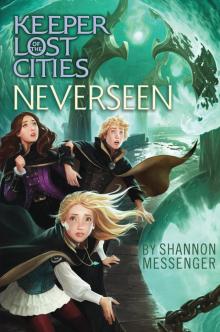 Neverseen
Neverseen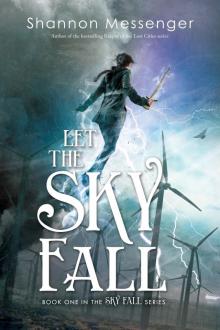 Let the Sky Fall
Let the Sky Fall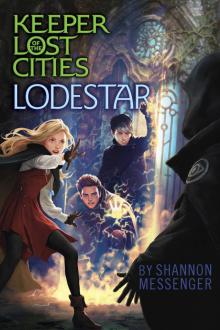 Lodestar
Lodestar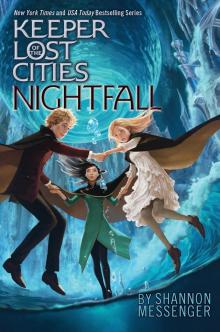 Nightfall
Nightfall Exile
Exile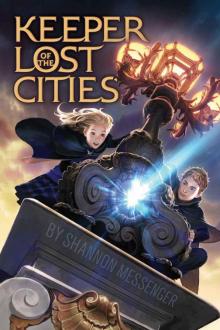 Keeper of the Lost Cities
Keeper of the Lost Cities Let the Wind Rise
Let the Wind Rise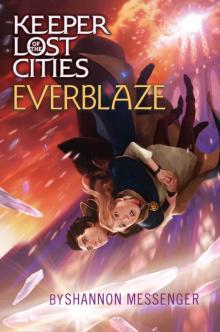 Everblaze
Everblaze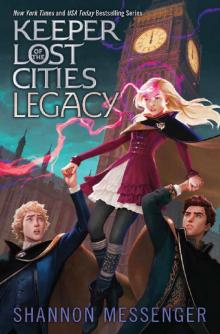 Legacy (Keeper of the Lost Cities Book 8)
Legacy (Keeper of the Lost Cities Book 8) Let the Storm Break
Let the Storm Break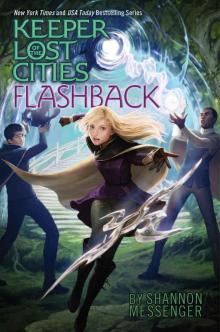 Flashback (Keeper of the Lost Cities Book 7)
Flashback (Keeper of the Lost Cities Book 7)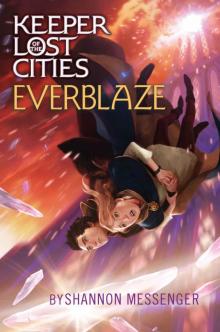 Everblaze (Keeper of the Lost Cities Book 3)
Everblaze (Keeper of the Lost Cities Book 3)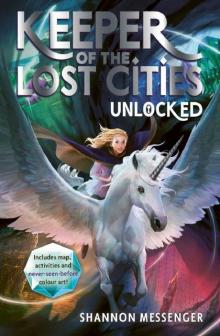 Unlocked 8.5 (Keeper of the Lost Cities)
Unlocked 8.5 (Keeper of the Lost Cities)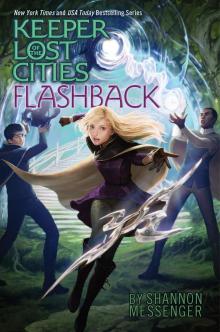 Flashback
Flashback